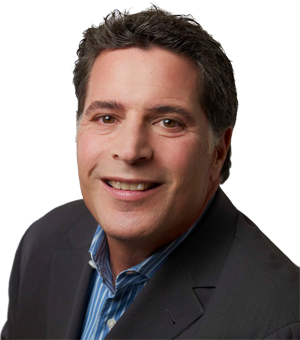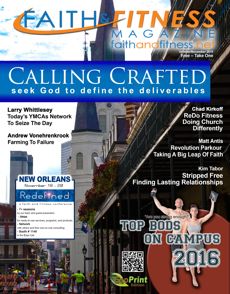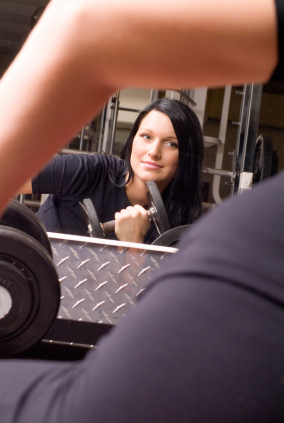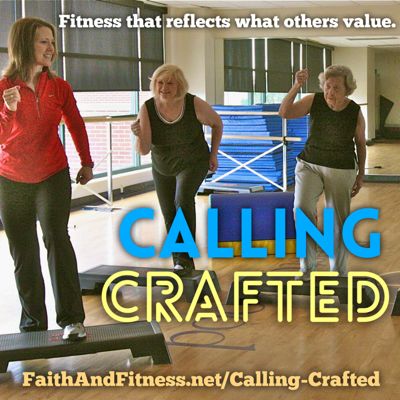 All those mirrors in the gym. They are in front of you, behind you and all around. Should they be there or not?
All those mirrors in the gym. They are in front of you, behind you and all around. Should they be there or not?
[NOTE: This article was originally written to speak especially to those who work in the fitness business. However, it is equally relevant and useful to individuals who enjoy some kind of personal fitness, sport or recreation AND want to do personal fitness ministry.]
The main reason for them is so that you can watch yourself and assure that you have good form (execute the movement properly). But as Sean Yang who has been a personal trainer says, “Think about your last workout. On what exercises did you actually look in the mirror for the purpose of seeing if your form was correct? On a basic exercise at light weight, your form is likely correct. If it’s not correct, you probably don’t know it’s not correct.”
He continues, “Really, people just like looking at themselves.” Many agree and you’ll no doubt see plenty of people admiring their own physique and that of others in gyms that reflect the human form from nearly every angle. But, how well does your gym reflect who you are spiritually?
According To Christina Corcoran in a Psychology Today article, “[Mirrors] may make beginners self-conscious and ultimately discourage them from going to the gym. Researchers found that sedentary women exercising face-to-face with their reflections walk away feeling less energized, less relaxed, and less good about themselves than women who work out without mirrors to gaze at.”
However, this isn’t a conversation about if there should or shouldn’t be mirrors in the gym. Instead consider all the factors that land people in the gym in the first place. What draws them? Allow me to suggest that you instead ask, “Who draws them?” I’ll also suggest the answer: the Spirit of God. Let me suggest a bit more:
Most people won’t identify that they exercise, ‘because God told me to’. Church leaders could help if they’d just encourage people to get physically active as frequently as they encourage them to give money and become a member. Regardless, all of us are human spirits packaged in a physical body. Those physical bodies, healthy or sick, strong or weak, speak loudly to us. For those who respond by considering exercise and better nutrition it makes a difference when they can consider and utilize programming and benefit from services and leadership that strengthen them spiritually and give them the ability to consider God.
Simply stated: If you are a Christian and you are in the fitness business you need to recognize that God is specifically calling you. Listen well and wholeheartedly respond. Pursue God’s instruction, build on wisdom, demonstrate excellence, and expect to be the tool God uses to craft a bridge between the physical and spiritual.
If you are a Christian and you are in the fitness business you need to recognize that God is specifically calling you. Listen well and wholeheartedly respond.
That is not business as usual in the fitness culture. If you think that ‘bringing Jesus to the gym’ by developing and delivering innovative faith-centered fitness ministry would be a bad idea then quit rushing to quick and unsupported conclusions. Instead take a look at the following two insights:
WHAT THE RESEARCHERS SAY –
In a November 4, 2015 published article, Who Is Being Left Out Of Religious Research?, it says, “A growing number of Americans do not affiliate with a faith community, but among those who do, belief in God is constant and the number of people who say religion is very important to them is increasing, according to a new survey released Tuesday by Pew Research Center.” The survey draws conclusions about how religion is evolving in America. To deepen their understanding of contemporary spirituality, Pew researchers crafted two new questions on this year’s survey about gratitude and the meaning of life. “If we are seeing a move to less formal and more individualized religious or spiritual practices, what does that mean for questions we ask in religion surveys?” asked Daniel Cox, director of research at Public Religion Research Institute. “Asking about how frequently someone attends church or prays might not be sufficient to capture this movement.” Spirituality will likely become increasingly important if the shift away from organized religion continues, Cox said, noting that questions like Pew’s help researchers draw conclusions about what it means to be spiritual in America today.
WHAT A BUSINESS LEADER SAYS –
 “What are the ideas that you stand for as a leader? What is the really distinctive point of view you have — what people really respond to, value, what’s going to move them? The real challenge for leaders and organizations today is to make everything they do more memorable for the rest of the world to encounter. And that really does put a premium on kind of the performance art of how you do things, and the style and the sense of energy, and the big signals or small gestures you send that say, basically, “You know what? Every time you encounter me, every time you encounter my company, we’re going to do a little something that makes you smile, makes you think, that you weren’t expecting to encounter. One of the great challenges today for leaders — whether you’re running a health club, whether you’re making products that you sell into health clubs, whether you’re a high school athletic director — is how do you get your audiences, your constituencies, to pay attention to you in a world that is more oversaturated, overstimulated, overwhelming than ever before. How do you stand out from the crowd in a fatally crowded marketplace? Today, with so much change, so many offerings, so many claims, the middle of the road really is kind of the road to nowhere.”
“What are the ideas that you stand for as a leader? What is the really distinctive point of view you have — what people really respond to, value, what’s going to move them? The real challenge for leaders and organizations today is to make everything they do more memorable for the rest of the world to encounter. And that really does put a premium on kind of the performance art of how you do things, and the style and the sense of energy, and the big signals or small gestures you send that say, basically, “You know what? Every time you encounter me, every time you encounter my company, we’re going to do a little something that makes you smile, makes you think, that you weren’t expecting to encounter. One of the great challenges today for leaders — whether you’re running a health club, whether you’re making products that you sell into health clubs, whether you’re a high school athletic director — is how do you get your audiences, your constituencies, to pay attention to you in a world that is more oversaturated, overstimulated, overwhelming than ever before. How do you stand out from the crowd in a fatally crowded marketplace? Today, with so much change, so many offerings, so many claims, the middle of the road really is kind of the road to nowhere.”
These aren’t the words from some mega-church preacher or radical Christian evangelist. This is the perspective from Bill Taylor, Co-Founder of Fast Company Magazine and author of the book Practically Radical in his 2014 interview with Athletic Business Magazine.
One year later the leadership of Athletic Business Conference & Expo have taken these words to heart and are demonstrating leadership in the industry by giving opportunity for professionals to learn more at the 2015 Redefined Conference presented by Faith & Fitness Magazine.
Identify and invest in “passionately-Christian” professionals.
Let me be clear, I’m not advocating for fitness leaders and owners who don’t embrace the Christian faith to buy a program, introduce services or attempt to fabricate a package they don’t understand. But if you accept that Bill Taylor is correct, that people do respond to what moves them and what they value AND that the research is correct that spirituality will likely become increasingly important in America THEN do you ignore this or act upon it? I believe the time is better than ever for fitness and wellness businesses, churches and community organizations and individuals to identify and invest in “passionately-Christian” professionals who can create and deliver well-crafted faith-centered experiences and outcomes.
Who are these people and where do you find them? Not surprisingly, they are the educated, qualified, certified, practicing and enthusiastic professionals entering or established in the health and wellness industries already. Ideally they also have a degree in theology, Biblical studies, counseling, family or clinical psychology, career coaching or Christian ministry. You won’t know that and certainly won’t find it IF you don’t ask for it. That person self-identifies as having not just a vocation but a CALLING. Further that person doesn’t leave that calling to some ethereal feeling or unfulfilled hope, instead they have CRAFTED that vision into strategy, impact, energy and results.
 This is CALLING CRAFTED. That’s right I’m talking about creating in the industry professional positions, a corporate climate, a community of members where faith is celebrated as an intrinsic and necessary dynamic. Move past the archaic fears of offending people and deliver results.
This is CALLING CRAFTED. That’s right I’m talking about creating in the industry professional positions, a corporate climate, a community of members where faith is celebrated as an intrinsic and necessary dynamic. Move past the archaic fears of offending people and deliver results.
 Shannon in her MyFitnessPal posting, The Dreaded Gym Mirror, really brings this full circle when she says, “I couldn’t actually figure out WHY there were so many mirrors. I often wished they would remove them all. Those mirrors kept me from taking a group exercise class for months. But regardless of those mirrors, I kept going. I kept lifting, and I started taking more group exercise classes. One day in a tabata class, I watched myself instead of averting my eyes or carefully positioning myself away from the mirrors. I realized: I’d become an athlete. And I looked like one. So excuse me if you catch me looking at myself in those mirrors. I just sometimes literally cannot believe this is me – my body, my mind, my results.”
Shannon in her MyFitnessPal posting, The Dreaded Gym Mirror, really brings this full circle when she says, “I couldn’t actually figure out WHY there were so many mirrors. I often wished they would remove them all. Those mirrors kept me from taking a group exercise class for months. But regardless of those mirrors, I kept going. I kept lifting, and I started taking more group exercise classes. One day in a tabata class, I watched myself instead of averting my eyes or carefully positioning myself away from the mirrors. I realized: I’d become an athlete. And I looked like one. So excuse me if you catch me looking at myself in those mirrors. I just sometimes literally cannot believe this is me – my body, my mind, my results.”
Train strong in Christ,
Brad Bloom
P.S. Consider reading this again tomorrow and then forwarding the link to someone else.










